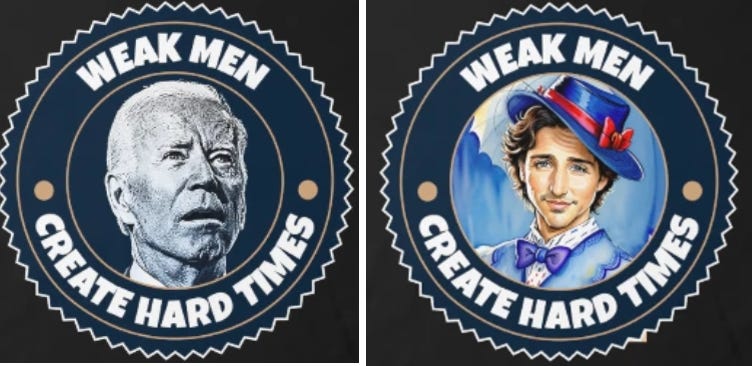Hard Men Create Good Times
Am I writing about the cycle of history or is Substack just full of thirsty thots?
What we obtain through isolation
Often leads us deeper into war...
So tell me how can I retreat?
Some things are worth fighting for...
And how do we justify
When actions are conceived in weakness?
Is there honor in my heart
If I lack the strength to act?
And though my hand is trembling
And my eyes are wreathed in so much doubt
And every instinct shows me fear
I stand my ground
-The Cruxshadows
Yes, of course this is the actual meme. And it’s… not exactly on the mark.
The meme encapsulated by the phrase "hard times create strong men, strong men create good times, good times create weak men, weak men create hard times" is a cyclical model often attributed to G. Michael Hopf's novel "Those Who Remain." This notion presents a simplified narrative of human history and societal evolution, suggesting a perpetual cycle driven by the interplay of strength, comfort, and adversity. Some people like to point to Bret Devereaux’s ACOUP blog series of posts on The Fremen Mirage as a possible debunking of this particular meme, and though he touches several times on this and speaks disparagingly of this societal narrative in particular, what he is referencing more than the meme is the concept that the untamed barbarians (the Fremen, from Frank Herbert’s Dune series, is the parallel he uses to compare them) are stronger than the decadent civilized folk - and, being a historian, he is quite clear that indeed no: in most cases the strategic and logistical advantage, as well as the training capacity and technological edge, not to mention the (for early civilizations in particular) sheer weight of numbers possible in agrarian culture vis a vis hunter-gatherer society all benefit the civilized forces and that as a rule one should bet against the Fremen. With the inevitable caveat: except for the Mongols.
For the purpose of dissection, this meme can be analyzed through several lenses:
If one were to regard this as a statement of historical trend, it is… dubious. Historically, the idea can be seen in patterns where societies that endure significant challenges often produce individuals with robust character traits necessary for survival and reconstruction; one might however reasonably conclude that this is what’s referred to as “survivorship bias.” Even if you were to take it at face value, this interpretation oversimplifies the complexity of human development and societal change. For instance, "good times" certainly have not universally led to the creation of "weak men"; rather, periods of peace and prosperity have often fostered innovation, cultural renaissance, and social advancements; all of which are self-sustaining for at least quite some time. Conversely, "hard times" do not necessarily produce universally "strong" individuals; they can also lead to despair, moral decay, or societal collapse if not managed with effective leadership. More often than not, “hard times” lead to “starvation and collapse” rather than a Darwinian breeding ground for the next supermen: as a concrete example, North Korea has been living in hard times for seventy years and mostly what it has produced is a lot of malnourished North Koreans.
Perhaps then, through the psychosociological lens? Psychologically, the resilience or "strength" of individuals might be less about the era they live in and more about personal circumstances, education, cultural values, and upbringing. Sociologically, the meme does not account for the roles of social structures, economic systems, or technological advancements in shaping character. Moreover, the meme's binary view of "strength" and "weakness" fails to recognize the spectrum of human qualities or the diverse ways in which societies might define these terms. It stretches plausibility to think that all humans would react similarly to adversity; even all people from the same group, tribe, or family. If one regards this as a restatement of Nietszche’s “what does not kill me makes me stronger” philosophy, perhaps: but imprimus, that statement is preposterous - many things that do not kill you instead leave you crippled; secundus, even if true, it would seem that there is a lot of unnecessary death in the “hard times” in order to make “strong men” that one might better achieve through a more competent training regimen.
Naturally, this may also be a philosophical lens on the world, as many such perspectives are. Philosophically, one might argue that the meme reflects a somewhat deterministic view of human nature, suggesting that external conditions dictate personal character without much room for individual agency or moral choice. This perspective could be challenged by philosophies that emphasize personal responsibility, the capacity for self-improvement, or the transformative power of education and enlightenment even in "good times."
Lastly, perhaps: from a cultural analysis perspective. The meme resonates in cultures that value stoicism, traditional masculinity, or narratives of decline and revival. However, its applicability varies across different cultural contexts where definitions of strength, weakness, or even what constitutes "good" or "hard" times might differ significantly. It is a common enough blackpill commentary on societal decay from those who feel that we are societally adrift - and nearly always when you see it posted, the implication is that we are in the phase where “weak men create hard times.” Often all subtlety will be abandoned and you’ll get logos like the following.

In conclusion, while the "good times make weak men" meme does capture a certain narrative of cyclical history and human behavior, its accuracy is highly suspect. It serves more as a cultural commentary or a heuristic for understanding certain patterns in history rather than a definitive explanation of societal or personal development. Like all memes, it simplifies complex dynamics for the sake of digestibility and virality, which can be both its strength in sparking discussion and its limitation in depth of analysis. But like any oversimplification, it should not be relied on for more than an aphorism or parable; when warfighters complained that their rules of engagement prevented them from fighting the Taliban on their own terms, that complaint was legitimate: but basing that complaint on this meme? Useful only to the extent that it conveys the complaint correctly, which given the eventual resolution, it would seem that it did not.
tldr: No. Try instead: “tough times don't last, but tough people do.”




The basic theory of “good times create weak men” seems plausible, and Ibn Khaldun was talking about this back in the 14th century when he observed that nomadic empires had a particular lifecycle. The first generation of nomads were disciplined and unified, but their grandsons inevitably became decadent and soft when raised in a sedentary civilization, and the empire would fall apart.
It’s harder to apply this theory today, since military power is based more on technology and industrial capacity than on the bravery of individual soldiers. The theory might still apply, just on a longer timeline (centuries instead of decades). Of course, the main problem with meme theories like this one is that they are essentially un-falsifiable. You can always move goalposts or modify definitions in response to criticism.
I don't know. On one hand, I would be very much in favour in the super-empathic, super-kind of liberal politics that is very much not hard men. On the other hand, I also know a tribe can only survive if it has kids and territory. And to return to that, some callousness might be needed.